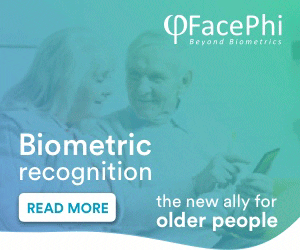
Selfie-based biometric onboarding has been one of the fastest-growing segments of the biometrics industry over the past few years, and saw a particularly sharp increase in adoption in the wake of the COVID-19, with so many organizations shifting to online channels and in need of secure identity verification solutions. FacePhi, as a pioneer in this area, has capitalized on this market shift, rapidly scaling up its workforce and securing tens of millions in financing to carry forward its momentum. It has also further established itself as a leading vendor in the remote onboarding space, recently winning Spain’s SME of the Year Award for 2020.
That success is certainly an underlying theme in a new interview with FacePhi CEO Javier Mira, but the company’s chief executive was keen to put a spotlight on the impact that his firm’s technology is having in the real world, discussing how it’s helping organizations to adapt to the conditions of the pandemic, and even helping to keep pensioners safe in Argentina. Read on to learn more about these positive effects of biometric tech, and for further insights from one of the leaders in the industry.
FindBiometrics: The coronavirus accelerated many face recognition-friendly trends last year, like the popularity of touchless authentication and the demand for remote and mobile ID verification. How did FacePhi respond to the pandemic in 2020?
Javier Mira, CEO, FacePhi: Undoubtedly, the need to continue accessing certain services and carrying out procedures while keeping social distance has given a great boost to biometric recognition systems such as those developed by FacePhi. Our R&D team has worked since the outbreak of Covid-19 to adapt our face authentication technology (Selphi) to the demand that has been generated around contactless identification solutions. In fact, within the first months of this health crisis we developed a new algorithm capable of identifying faces even with a mask on, thus trying to bring our technology even closer to society.
In recent months we have participated in projects with a significant social impact, in which the need to ensure user safety and avoid contact has been the key. For example, we collaborated with the Kangbuk Samsung Hospital in Seoul to introduce a facial recognition system that makes the identity verification process of patients much easier, eliminating medical cards and avoiding financial losses caused by fraud.
We have also worked with large companies in the financial sector, such as the Korean companies KB Securities, HancomWITH, Hanwha Investment & Securities or Daegu Bank, which have adopted our digital onboarding system so that their clients can open new accounts with just a selfie and a photograph of their ID. Through this process, face-to-face procedures and even videoconferences that had to be held during working hours are already being avoided.
Finally, one of the most notable success stories of 2020 has taken place in Latin America, specifically with the Argentine bank Supervielle. The implementation of our facial recognition system by this bank has led to a change in the pension system in Argentina, which now allows retirees to give “proof of life” from their mobile device, without having to leave home. Therefore, thanks to our biometric software, thousands of pensioners are being able to collect their pension without bureaucratic problems and without putting their health at risk. This has been a very important advance that has come at one of the toughest moments of the pandemic, with very strict lockdown policies.
FindBiometrics: What were FacePhi’s biggest achievements in 2020?
Javier Mira, CEO, FacePhi: One of the main achievements of FacePhi in 2020 has been to get biometrics to go beyond being an innovative solution for companies, and becoming a technology with a positive social impact.
Projects such as those developed with Banco Supervielle or the Kangbuk Samsung Hospital have shown that biometric recognition can be very useful to facilitate day-to-day life and protect groups such as patients in a hospital center or the elderly. With other initiatives, such as the one promoted with the Peruvian fintech TuSueldoYa, we have also shown that biometrics can be used to facilitate procedures as important as the fast and secure advance of payroll, helping companies and workers.
Looking back, 2020 has been a year in which we have consolidated the most socially responsible facet of biometrics.
FindBiometrics: FacePhi’s biometric technology is now being used for mobile authentication for pensioners in Argentina. What makes biometrics so appealing to the pensioner demographic, and where do you expect biometric pension collection to catch on next?
Javier Mira, CEO, FacePhi: The users that make up the senior & silver economy are a growing demographic with more digital skills, so offering them convenient, fast and secure access to financial and health services, to cite two examples, is increasingly interesting for companies. The other side of the coin is those older people who suffer from the digital divide and have problems accessing services, both private and public. In these cases, biometrics plays an even more important and socially responsible role, because it helps these users to stay connected simply and safely.
The Argentine experience has been very positive and has shown the potential that biometrics has for senior users such as pensioners. We are convinced that it is a matter of time before banks in other Latin American countries adopt a similar system.
FindBiometrics: From your perspective, what is the biggest challenge facing the biometrics industry as we enter 2021 and what opportunities does it present?
Javier Mira, CEO, FacePhi: Although we live immersed in a global process of digital transformation, we are a society in which there are still many processes dependent on passwords, document signatures and face-to-face procedures. The challenge of biometrics is to demonstrate that it can replace these processes, improving their accessibility and security.
On the other hand, this challenge opens the door to new opportunities, as we have already seen working with large financial companies. For example, the digital onboarding project that we have developed for Daegu Bank has promoted a regulatory change in Korea to allow the opening of bank accounts through facial recognition, confirming the security and respect for the privacy of the data in this system. In fact, the Korean authorities have selected this initiative to participate in their regulatory sandbox “Innovation Financial Services”.
FindBiometrics: What can we expect from FacePhi in the coming 12 months?
Javier Mira, CEO, FacePhi: Our goal is to continue strengthening our presence in Asia, where we already develop projects with large companies in the financial, banking and healthcare sectors, but without losing sight of Latin America, a very dynamic market, open to innovation and in which FacePhi is a leader. At the same time, we will continue working to spread biometrics to other sectors and maintain the confidence of our investors, taking care of our presence on the stock market.







Follow Us